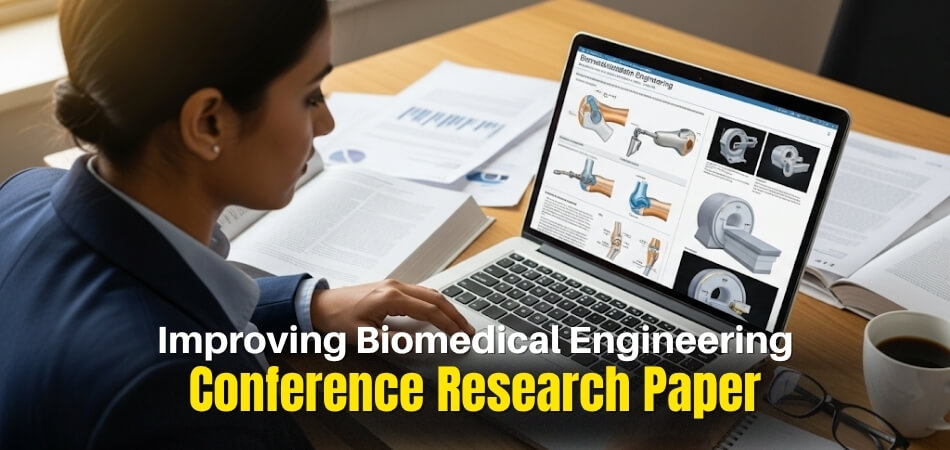Writing a research paper for a biomedical engineering conference can seem like a big task. There’s a lot to think about, from choosing the right topic to making sure your ideas are clear. If you’re wondering how to make your work better and stand out, you might be looking for 5 tips to improve biomedical engineering conference research paper.
To improve a biomedical engineering conference research paper, focus on five main things: choose a clear topic, use simple language, give real-life examples, keep the structure neat, and always check your work before finishing. These steps help your paper stay easy to follow, interesting to read, and ready for submission.
Do you want to make your paper better and learn how to write it the right way? If so, then keep reading this article because it covers everything you need to know.
5 Tips to Improve Biomedical Engineering Conference Research Paper
Preparing a research paper for a biomedical engineering conference can be challenging. But don’t worry—there are simple ways to make it better. A few small changes can help your paper stand out and be easier to read. Continue reading to discover how to make your research paper clear, strong, and engaging.
Pick a Clear Topic
It’s important to choose one simple topic for your paper. Don’t try to talk about too many things at once. If you focus on just one idea, your writing will be easier to follow. This helps people understand your main point without getting confused. A clear topic also makes it easier for you to stay on track while writing. Keep it simple and stick to one main goal.
Explain Things Simply
Your paper should be easy to understand, even for someone who doesn’t know much about the topic. Use short and simple sentences to make your ideas clear. Try not to use too many hard words or long paragraphs. If you must use a big word, explain what it means. Use simple examples to help explain your points better. When your paper is easy to read, more people will enjoy it.
Add Real Examples
Adding real examples makes your paper stronger and more interesting. You can talk about real cases, tests, or small projects that show your idea in action. Examples help people understand how your idea works in the real world. You can even mention events like upcoming conferences in USA or in other countries, where similar ideas are being shared. They also show that your work is not just guesswork. One good example can explain a lot more than a long paragraph.
Keep It Organized
Your paper should be in the right order from beginning to end. Start with a short introduction to tell what your paper is about. Then write the main part with all your points and details. Finish with a conclusion that sums up your idea. Don’t mix everything together—keep each part in its place. A neat and organized paper is much easier to read and understand.
Check and Improve
After writing, read your paper again to find any mistakes. Fix spelling or grammar problems and remove parts that don’t make sense. Try reading it out loud to see if it sounds okay. You can also ask someone else to read it and give feedback. Making small changes can really help improve your work. Don’t be afraid to edit—even great writers make changes.
Structural Mistakes to Avoid in a Biomedical Engineering Conference Research Paper
Writing a research paper for a biomedical engineering conference can be exciting, but sometimes small mistakes can create big problems. These mistakes can make your paper hard to follow or even get it rejected. Knowing what to avoid can really help. Let’s look at some key things you should watch out for.
Unclear Paper Title
The title is the first thing people see, so it should be simple and direct. If your title is too long or confusing, readers might not even want to read your paper. Avoid using hard words or complex phrases. Keep it short and explain clearly what the paper is about. A good title helps your paper stand out.
Missing Flow Between Ideas
Even if your points are good, your paper can feel jumpy if the ideas don’t connect well. Each paragraph should lead to the next one in a smooth way. Use simple words like “also,” “because,” or “for example” to keep things connected. When the flow is missing, the paper feels broken and hard to follow. A smooth flow keeps the reader interested.
Poor Use of Figures
Charts, graphs, or images can help, but only if they are used the right way. Some papers throw in figures that are not needed or don’t match the text. Every figure should help explain your point better. Make sure to label them clearly and talk about them in your writing. If you use them well, they make your paper stronger.
Wrong Format Style
Each conference has its own rules for things like layout, spacing, and font. Not following them can make your paper look messy. When you submit a research paper to a biomedical engineering conference, using the wrong format can get it rejected. Check the rules before you start writing. Keeping the right format from the beginning saves time later. It also makes your paper look neat and ready.
No Summary at End
A lot of papers forget to include a short summary at the end. This part is important because it reminds the reader what the paper was about. Without it, the paper can feel like it ends too suddenly. Use this space to repeat your main point in simple words. A short, clear ending helps the paper feel complete.
Should You Include Case Studies or Simulations in Your Biomedical Research Paper?
Sometimes, adding case studies or simulations can make a research paper stronger and more interesting for the reader to follow along. These tools help show how your ideas work in real situations instead of just writing theories or facts. Case studies are like short stories that show what happened in a real test or project. Simulations are like pretend tests done on a computer to check how something might work in the real world.
Case studies can be very useful if your research is based on something that already happened or was tested before in detail. They help show real results, not just guesses, which makes your paper more trustworthy and easier to understand. Simulations are great when it’s too hard or unsafe to test something in real life. You can use them to show what might happen if a plan or method is used.
Both case studies and simulations have their own benefits, so use the one that fits your topic and goal the best. If you have real data or stories to show, case studies are the right choice to go with. When you’re trying new ideas or models, simulations can explain your work clearly and safely. In the end, using either one should make your research paper clearer and useful to the reader.
What Do Reviewers Look for in a Biomedical Engineering Conference Research Paper?
When someone sends their research paper to a biomedical engineering conference, reviewers check it carefully before it gets accepted. They look at many parts of the paper to see if it’s worth sharing. Here is what really catches their attention:
Clear Writing
Reviewers like papers that are easy to read and understand. If your sentences are too long or confusing, they might lose interest. Use simple words and explain each idea clearly. Don’t assume the reader already knows everything about your topic. A clear paper always makes a better impression.
Useful Contribution
Your paper should bring something new or helpful to the topic. Even small ideas can be important if they solve a real problem. Reviewers want to see if your work adds value to the field. It’s not about being perfect — it’s about being useful. If your paper helps in any way, that matters.
Right Format
Using the correct format shows that you’ve followed the rules of the conference. That means writing your paper the way they ask, including headings, references, and page limits. Reviewers don’t like messy or poorly arranged papers. A neat layout makes your paper easier to check. Always follow the given format from the start.
Strong Method
The method section tells how you did your research. It should be clear, step-by-step, and easy to repeat. If the method is weak or missing, reviewers may not trust your results. A strong method shows that you’ve done the work properly. That gives your paper more strength and value.
Fits the Topic
Your paper should match the theme of the conference. If the topic doesn’t fit, the paper might get rejected even if it’s good. Always read the conference details before you write. Reviewers check if your work belongs in that event. Make sure your topic is the right match.
Real Results
Reviewers want to see real data or useful results from your research. Just sharing ideas without any proof is not enough. Show what happened after your test or study. Even small results are better than none. Proof makes your paper stronger and more believable.
When to Seek Mentorship or Peer Review for Your Research Paper?
Writing a research paper for a biomedical engineering conference takes time, effort, and clear thinking. Along the way, you might feel stuck or unsure about some parts. That’s when asking someone for help can really make a difference. Let’s look at the best times to do that.
Stuck on Structure
If you’re not sure how to start or arrange your paper, it’s okay to ask someone for help. A mentor or peer can guide you with the layout and what to include. They can also tell you if something feels out of place. Sometimes, we don’t see the small problems in our own writing. Getting advice early can save time later.
Not Sure About Content
Sometimes, it’s hard to tell if the content you’re writing is enough or even useful. You may wonder if your topic is too basic or too broad. A peer or mentor can point out what’s missing or what’s extra. They can also suggest better ways to say things. This kind of help makes your paper more complete.
Before First Draft
You don’t need to wait until your paper is fully written to ask for help. Sharing an outline or early draft is a smart move. You can get advice before you do too much work on the wrong thing. It also helps you feel more confident as you write. A little support early on goes a long way.
After Editing
Even after you’ve checked your spelling and fixed sentences, feedback still helps. A fresh reader might find mistakes you missed. They can also tell you if anything is confusing or unclear. It’s better to know now than after you send it in. A review at this stage is very useful.
Trouble Explaining Ideas
If it’s hard to explain your idea clearly, that’s a sign to ask for feedback. A mentor can help you say things in a simpler way. If someone else understands it, that means you wrote it well. They can also suggest better examples or words. Good advice makes your work shine.
Before Submission
One of the best times to get a review is right before you send your paper. A quick check by someone else can catch small errors or weak parts. It’s like doing a final clean-up before showing your work to others. This can help you feel more sure of your paper. Don’t skip this step.
Things You Should Prepare Alongside Your Biomedical Engineering Conference Research Paper
Preparing for a biomedical engineering conference takes more than just finishing your research paper. There are a few important things to think about that can boost your confidence and help you leave a strong impression. A little planning goes a long way. Read on to learn what else you should have ready.
Travel Essentials
If the conference is in another city or country, you’ll need to plan your travel early. Make sure your tickets, ID cards, and hotel bookings are ready ahead of time. Pack your clothes, charger, laptop, and must-have items for Biomedical engineering conference, like copies of your research materials. Don’t forget a notebook and a pen for quick notes. Staying prepared helps you focus better on the event and enjoy the experience.
Short Presentation Slides
Most conferences ask you to talk about your paper, so having slides ready is a smart idea. Keep the slides simple with short points and pictures. Don’t fill them with too much text. Use them to explain your idea step by step. They should help people understand your paper better.
Quick Talk Script
You might need to speak for a few minutes about your paper. It’s good to prepare a short script to stay on track. Write it like you’re talking to someone in a friendly way. Practice reading it a few times to feel more sure. This will help you speak clearly and not forget anything.
Poster Printouts
Some events also ask for a printed poster about your research. It should have the main idea, a few pictures, and your results. Make it colorful but not too crowded. Use large letters so people can read it easily. Posters help others learn about your paper quickly.
Handout Sheets
A one-page handout can be useful for people who want to remember your paper. You can add a short summary, your name, and contact info. Keep the layout clean and easy to read. It’s a small thing that leaves a big impact. Many people keep these for future use.
Practice Questions
Before the conference, think of questions someone might ask about your paper. Write them down and prepare your answers. This helps you feel calm if someone does ask. Don’t try to memorize everything, just understand your topic well. Being ready makes a big difference.
Backup Files
Always save extra copies of your work in a safe place. You can use a USB, email, or cloud storage. If something goes wrong, you won’t lose anything. Also, carry a printed version just in case. A small backup plan can save the day.
Frequently Asked Questions
Even after reading helpful tips, you might still have some questions about writing or improving your research paper. That’s completely normal. Here are some common questions and clear answers that can help you write a better paper and feel more confident about your work.
How Do I Know If My Research Topic Is Strong Enough?
A strong research topic should be clear, focused, and related to real problems in biomedical engineering. It should not be too wide or too narrow. A good topic also gives you enough information to explain your points clearly. You should feel sure that your topic is worth exploring.
Why Should I Avoid Long Introductions in My Paper?
Long introductions can make readers lose interest before getting to the main idea. Keep your introduction short and clear. It should tell what your paper is about and why it matters. Don’t go too deep—just give a quick overview to start strong.
Is It Okay to Use Bullet Points in a Research Paper?
Using bullet points is fine in small sections, like lists or steps in your method. But don’t use them too much. A research paper should still look like a full piece of writing. Use bullets only when they help explain something more clearly.
How Important Is the Paper’s Title Format?
The title format is more important than most people think. A neat, clear title makes your paper look professional right from the start. Follow the rules the conference gives about font size or length. This small thing helps you make a strong first impression.
Can I Use First-Person Words Like “I” or “We”?
It depends on the style guide of the conference. Some allow first-person use, while others prefer a more neutral tone. If you’re working in a team, using “we” may be more fitting. Always check the conference rules before choosing your writing style.
What If My Topic Is Already Studied By Others?
That’s okay! You can still write your paper by showing a new view, better method, or updated results. Make sure you explain what’s different in your work. Even if others have worked on it, your paper can still add something useful.
How Do I Make Sure My Paper Isn’t Too Boring?
Keep your writing simple and your ideas clear. Use real examples, add useful graphs, and explain why your topic matters. Don’t just fill the paper with long words or extra facts. Focus on the main idea and make each part easy to follow.
Conclusion
Taking your research paper to the next level can be easier than you think. With the right approach and a few smart choices, you can make your work stand out at any biomedical engineering conference. Every small improvement helps you get closer to your goals and makes sharing your ideas more rewarding.
When you use the 5 Tips to Improve Biomedical Engineering Conference Research Paper, you build a strong base for success. Clear writing, real examples, simple words, neat structure, and a good review make a big difference. These tips help your paper stay interesting and easy for others to understand.
Ready to give your research the attention it deserves? Keep these tips in mind and enjoy the process of sharing your ideas. A little extra effort now will help you shine when it really counts.









